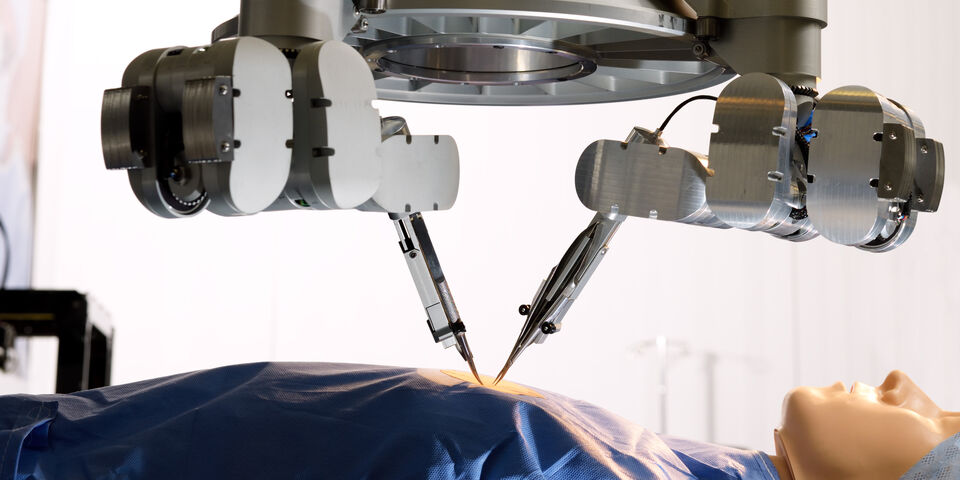Prof Talk | Eindhoven surgical robots improve the surgeon's hands
Like to watch a robotic surgical operation live at Catharina Hospital? You can today - Wednesday May 22nd - as part of Dutch Technology Week. A few months ago the hospital started using a new surgical robot designed to carry out complex cancer operations. As more and more hospitals are turning to robots to bring even greater precision to their work, patients and physicians are embracing the new technology. “This costly surgeon's toy will become commonplace,” predict TU/e professor and medical robotics pioneer Maarten Steinbuch and MicroSure founder Raimondo Cau.
Surgical robots are not new. Since the first commercial surgical robot, Da Vinci, was released onto the US market some twenty years ago, this robot has been used for an increasingly range of medical procedures. The surgeon operates the vibration-free robotic arms remotely while he or she has a 3D view of the surgical site on a screen.
A better work posture, the ability to work more precisely and less blood loss are, say surgeons, the great benefits. In recent years Dutch hospitals too have been purchasing the Da Vinci surgical robot, among them the Catharina Hospital Eindhoven. This Wednesday those who are interested can watch live as an operation is carried out by their latest Da Vinci Xi Robot.
TU/e professor Maarten Steinbuch - who has years of involvement in surgical robot technology - believes this development is only logical. “We are giving surgeons better eyes through the use of microscopes, great navigation systems that they can track on a screen, but until now little has been done to improve their hands. And to carry out an operation well you need both excellent eyes and excellent hands. This is in fact what medical robotics is now doing: giving surgeons better hands as a way of improving the quality with which surgery is performed. Physicians are generally enthusiastic: they no longer need to spend hours in an awkward position bending over a patient and can operate more precisely without trembling hands. Admittedly, the Da Vinci is an expensive system and means the cost of each operation is high, but there's a lot of development work relating to general surgical robots being carried out by competitors with a view to reducing the cost of operations.”
Ophthalmic robot
Thus surgical robots can improve the human hand considerably. While this can be said of the Da Vinci-like robots, it is particularly true of the surgical robots developed to perform one specific task. And this is a field on which the Eindhoven region - with its expertise in high-precision robotics - has focused in recent years. And with success. Already three startups to have emerged from TU/e, Preceyes, MicroSure and Eindhoven Medical Robotics, are busy launching surgical robots commercially.
Preceyes has developed an ophthalmic robot - Steinbuch: “Twenty times as good as the best ophthalmic surgeon”- which last week was used at the Rotterdam Eye Hospital to carry out the first robotic retina operation.
MicroSure,founded by TU/e employee Raimondo Cau, is working on robots for use in microsurgery. Cau: “In reconstructive surgery doctors tried to make progress using Da Vinci, but the large robotic arms proved too clumsy for the tiny blood vessels that had to be joined up. They came to us looking for a robot with another level of precision, developed specifically for microsurgery. This is now operational and works so well that we are now using it to reconnect lymphatic vessels - measuring 0.3 mm in diameter - after breast surgery. The initial studies are very positive.”
Cau believes in the single-task concept. “It's just like a toolbox with various tools, for any job you take the best tool. It's just the same for surgical robots. Removing a uterus is unlike stitching a capillary.”
Both Cau and Steinbuch are convinced that robotic surgery is the future. “It's still early days,” says Cau, “but already robots are being used more and more as a matter of routine. In the United States it's noticeable that patients head for centers where doctors carry out a lot of robot-guided procedures.”
Steinbuch: “Patients have confidence in the consistent quality and the greater likelihood of success offered by the use of robots. However, a significant challenge lies in ensuring that the entire system offers added value, benefit to the insurer as well as the patient and surgeon. More studies of this are needed. With Eindhoven Medical Robotics we are now developing the first autonomous surgical robot. Another step forward: the doctor in the role of director instead of being the one performing the operation. Having three innovative companies working in combination with mechanical engineering and the high-tech industry puts us in a unique position. As in other fields, for medical robotics Eindhoven is the place to be.”
Dutch Technology Week
The Dutch Technology Week will take place from May 20 through 25, 2019 with various events being held throughout the region. The event will draw to a close on Saturday May 25th with the High Tech Discovery Route. For the full program, go to https://www.dutchtechnologyweek.com/




Discussion